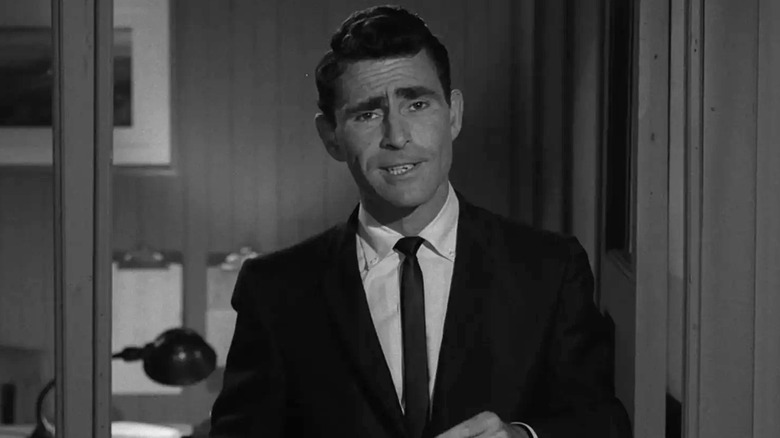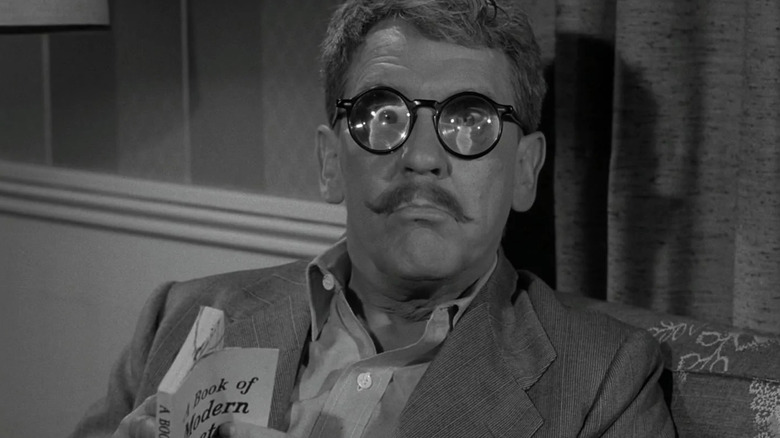The Twilight Zone Creator Rod Serling Felt That One Thing Hurt The Series The Most
We may receive a commission on purchases made from links.
Rod Serling's anthology series "The Twilight Zone" nailed it. Serling not only had a boundless imagination as a writer, but he was also knowledgeable enough of the then-contemporary sci-fi scene to tap some of his generation's best sci-fi authors to contribute to "The Twilight Zone." In the end, he and his creative team were able to construct 156 miniature morality plays — and 156 ironic twist endings — over the course of the show's five-season run. Serling also attracted a plethora of notable actors to "The Twilight Zone," each one giving an intense performance in a (very often) well-written episode. One wonders how Serling and co. managed to create such a gigantic volume of TV episodes in such a short amount of time.
As it were, it was far from a walk in the park. Serling was working under an intense TV schedule, one common at the time, that demanded a whole new episode per week. And while other shows like, say "Gunsmoke," could easily pull off a weekly grind, it was trickier For "The Twilight Zone" as there were no commonly used sets and no returning cast members. "Gunsmoke" had James Arness every week and filmed on the same Dodge City set already finished on the Paramount backlot. "The Twilight Zone," on the other hand, had to scramble for resources every time.
Serling spoke on multiple occasions about how fast — and how exhausting — the show's production timeline was. He also lamented that "The Twilight Zone" had to operate on a pretty tight budget, which was a major factor in the swift turnaround times. In Martin Grams Jr.'s history book "The Twilight Zone: Unlocking the Door to a Television Classic," Serling is quoted as lamenting the series' low budgets, feeling that the accompanying quick production schedule cause the show to suffer in terms of quality. He added that if he and his writers had been granted more time to develop and shoot some of the episodes, "The Twilight Zone" would have been much better.
Rod Serling never had enough time (or money) to make The Twilight Zone
Serling noted that most shows that ran contemporaneously with "The Twilight Zone" had only three-day filming schedules. "The Twilight Zone," however, was often granted a little extra time by CBS because it was an anthology series. Its budget, incidentally, usually hovered around $50,000 per episode, with episodes like "The Midnight Sun" employing cheap special effects to help keep their price tag down. Combined, these factors made the show feel a little too ramshackle by Serling's standards. Indeed, he resented that the budgets were consistently too low and the shooting schedule consistently too short. Because of this, he felt the show as a whole often emerged as too sloppy and unpolished for his tastes. As he put it:
"A series can be sustained with top quality writing and acting, but suffers when filmed from economics. [...] It's rare that a show can shoot in more than three days and it is this too-brief shooting schedule that is reflected in the lack of consistency in film shows. This is particularly true in anthologies. When 'The Twilight Zone' came up with a rock on occasion, this was occasionally the net result of sloppy writing, but more often it reflected a lack of time to polish the show properly."
Serling may have been holding himself to higher standards than the show's many fans, though. While fans can see the series occasionally straining against its budget, Serling was good about writing smaller stories that took place in limited areas (including houses, tiny towns, cabins, libraries, and even the bottom of a trash can). Overall, "The Twilight Zone" found creative ways to work within its budget. If the show had to film in Death Valley, everyone on its crew kept costs down by merely eating salads. As the saying goes, necessity is the mother of invention. And while one might wish Serling had the budgets and the schedules he wanted, one can see that he made out okay.
The series' ironic endings were no less ironic because of budgetary limitations.

